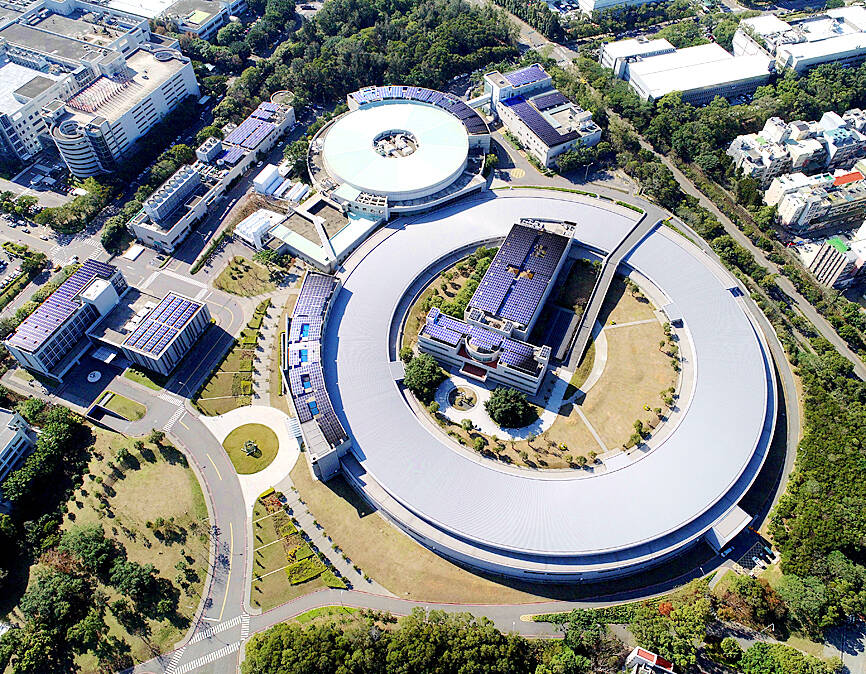The National Science and Technology Council is considering shuttering the three-decades-old Taiwan Light Source (TLS) program and expanding the Taiwan Photon Source (TPS) project from 14 storage rings to 25 to facilitate the government’s tech diplomacy policy, an official said on Saturday.
The council is tasked with operating the TLS and TPS programs, which are responsible for producing synchrotron radiation that is often used by the semiconductor, materials science, pharmaceutical, astronomy and green energy sectors, National Synchrotron Radiation Research Center Deputy Director Wei Te-hsin (魏德新) said.
Scientists can use the range of synchrotron radiation wavelengths, which include infrared, visible light, ultraviolet rays and X-rays to atomic and nano-scale, to conduct research, Wei added.

Photo courtesy of the National Synchrotron Radiation Research Center
When initiated 30 years ago, the light source program was a third-generation synchrotron accelerator, while the TPS system, activated in 2016, is still considered one of the more powerful synchrotron accelerators in the world.
The council is considering decommissioning the TLS program as it is dated, and would be gradually expanding the TPS program until it has 25 storage rings, Wei said.
There are about 70 synchrotron accelerators across different countries, which is a clear indicator of a country’s technological development, he said, adding the open interaction between synchrotron accelerator centers would benefit researchers worldwide.
Taiwan has a special division at Japan’s synchrotron accelerator SPring-8 and at the Australian Nuclear Science and Technology Organisation, granting Taiwan priority access to the facilities for experiments, he said.
The Max Planck Institutes in Germany have been working with Taiwan to build an end station, and in light of Japan’s SPring-8 producing one of the highest brightness sources of X-rays worldwide, Taiwan’s centers are also considering upgrades, the council said.
Former National Science and Technology Council deputy minister Chen Tzong-chyuan (陳宗權) said the number of Science Citation Index articles published in international journals using the National Synchrotron Radiation Research Center’s synchrotron accelerator increased to 602 last year, up from 413 in 2019.
The average influence index of these articles has also increased by 11.51 last year, up from 7.39 in 2019, he added.
Upgrades to the synchrotron accelerator would help develop Taiwan’s five “trusted industries,” namely semiconductors, next-generation communication, artificial intelligence, military engineering and surveillance technologies, he said.
The upgrade would also benefit other policies, such as improving Taiwan’s general health and reducing carbon emissions, while promoting the application of synchrotron technology in semiconductors, biomedicine and next-generation green power generation, he added.

The first global hotel Keys Selection by the Michelin Guide includes four hotels in Taiwan, Michelin announced yesterday. All four received the “Michelin One Key,” indicating guests are to experience a “very special stay” at any of the locations as the establishments are “a true gem with personality. Service always goes the extra mile, and the hotel provides much more than others in its price range.” Of the four hotels, three are located in Taipei and one in Taichung. In Taipei, the One Key accolades were awarded to the Capella Taipei, Kimpton Da An Taipei and Mandarin Oriental Taipei. Capella Taipei was described by

The Taichung District Court yesterday confirmed its final ruling that the marriage between teenage heir Lai (賴) and a man surnamed Hsia (夏) was legally invalid, preventing Hsia from inheriting Lai’s NT$500 million (US$16.37 million) estate. The court confirmed that Hsia chose not to appeal the civil judgement after the court handed down its ruling in June, making the decision final. In the June ruling, the court said that Lai, 18, and Hsia, 26, showed “no mutual admiration before the marriage” and that their interactions were “distant and unfamiliar.” The judge concluded that the couple lacked the “true intention of

EVA Airways today confirmed the death of a flight attendant on Saturday upon their return to Taiwan and said an internal investigation has been launched, as criticism mounted over a social media post accusing the airline of failing to offer sufficient employee protections. According to the post, the flight attendant complained of feeling sick on board a flight, but was unable to take sick leave or access medical care. The crew member allegedly did not receive assistance from the chief purser, who failed to heed their requests for medical attention or call an ambulance once the flight landed, the post said. As sick

INDUSTRY: Beijing’s latest export measures go beyond targeting the US and would likely affect any country that uses Chinese rare earths or related tech, an academic said Taiwanese industries could face significant disruption from China’s newly tightened export controls on rare earth elements, as much of Taiwan’s supply indirectly depends on Chinese materials processed in Japan, a local expert said yesterday. Kristy Hsu (徐遵慈), director of the Taiwan ASEAN Studies Center at the Chung-Hua Institution for Economic Research, said that China’s latest export measures go far beyond targeting the US and would likely affect any country that uses Chinese rare earths or related technologies. With Japan and Southeast Asian countries among those expected to be hit, Taiwan could feel the impact through its reliance on Japanese-made semi-finished products and